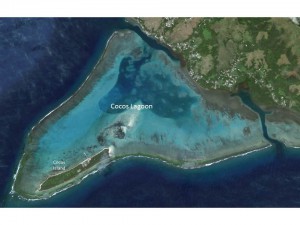NCCOS scientists recently traveled to Guam for a project funded by NOAA’s Coral Reef Conservation Program (CRCP), to help quantify chemical contamination in Cocos Lagoon, located at the southern tip of the island. Working with local partners, including the Guam Environmental Protection Agency, Guam Department of Agriculture, the University of Guam, NOAA NMFS and CRCP, and sampling from Guam EPA boats, project partners collected sediment and fish samples throughout the Lagoon.

A number of chemical contaminant classes, particularly polychlorinated biphenyls(PCBs), werefound adjacent to Cocos Island within the Lagoon, and maybe associated with anabandoned US Coast Guard Long Range Navigation (LORAN) station, which operated between 1944 and 1963. Used previously in many industrial applications but now banned for most uses, PCBs are long-lived environmental contaminants that have been associated with neurologic, reproductive and carcinogenic effects in animals. Results from the analysis of the sediment and fish samples, expected by the end of 2015, will delineate areas of concern in the Lagoon, serve as a baseline that will be useful in making informed management decisions, and help inform the local community.
Read blog posts from the mission at the links below:
For more information, contact Tony.Pait@noaa.gov , Ian.Hartwell@noaa.gov, or Dennis.Apeti@noaa.gov.
